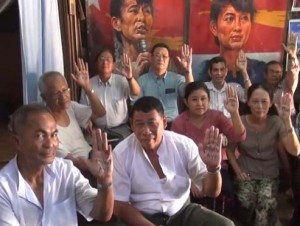25 Years On, Freedom of Association Remains an Illusion
By Burma Partnership • August 5, 2013 On 27 July, the Public Affairs Management Committee published the draft Association Law with a notice calling for comments and recommendations. The 9 August deadline to send comments allows so little time for recommendations that it makes it almost meaningless. Civil society organizations quickly reacted to the draft bill by publishing a statement endorsed by 87 organizations. The statement rejects the draft law and calls for any discussion in the Parliament to be suspended in order to allow sufficient time for broad and meaningful consultations.
On 27 July, the Public Affairs Management Committee published the draft Association Law with a notice calling for comments and recommendations. The 9 August deadline to send comments allows so little time for recommendations that it makes it almost meaningless. Civil society organizations quickly reacted to the draft bill by publishing a statement endorsed by 87 organizations. The statement rejects the draft law and calls for any discussion in the Parliament to be suspended in order to allow sufficient time for broad and meaningful consultations.
Similarly the Myanmar National Human Rights Commission (MNHRC) draft law was published on 7 July following similar proceedings. Again, the draft law was immediately tabled in the Parliament, limiting time for consultations and recommendations by civil society organizations.
The draft Association Law violates people’s right to freedom of association. The law must be almost entirely redrafted if it is to comply with international legal standards. In its current form it serves no other purpose than perpetuating government’s control over civil society.
The draft law puts excessive restrictions on freedom of assembly when it states that “associations” must not harm “community peace.” International law allows only limited and narrowly defined exceptions to freedom of association. “Community peace” is not one of them and is too broadly worded to be acceptable. The law also makes registration compulsory and not voluntary. Unregistered associations are prohibited from operating and the penalty for establishing or even participating in an unregistered association is disproportionate. Individuals can respectively face up to three years or six months imprisonment.
The “Central Body”, established by the draft law and composed of ministers, has the power to deny registration to association as well as repeal registration license if an association “altered its aim or programs.” In addition, the registration license is for tenure of only five years, requiring every association to fully reapply for permission to exist every five years. In other words, the draft law grants the Central Body the power to deny, withdraw or not renew the licenses of organizations arbitrarily and with no legal safeguard. The Central Body’s power is arbitrary since the law fails to provide criteria against which organizations’ application will be assessed. This threatens transparency and gives discretionary powers to the Central Body to deny registration on political factors. In addition, the law does not provide for the right to appeal or to judicial review of the Central Body’s decision.
Finally the law restricts associations to social welfare activities excluding associations working on issues such as human rights or peace. The law should allow for organizations to embrace all activities that can legally be engaged by individuals. In a country transitioning to democracy, “peace” and “human rights” should not be considered as dirty words anymore.
The draft Association Law repeals the old oppressive 1988 Law Relating to the Forming of Organization that was adopted following the 1988 student uprising. This week, on 8 August, Burma will celebrate the 8.8.88 jubilee anniversary. On this important day the repeal of the 1988 law could have been an important symbol of change and reconciliation. Instead, the new draft Association Law perpetuates Burma’s old fashion way of dealing with civil society and restricting freedom.
The international community must immediately put pressure on the government and the Parliament to ensure the draft Association Law is dropped and that a new law is drafted with broad and meaningful participation of local and international civil society to guarantee freedom of association for the peoples of Burma.
Tags: Association Law, Burma Partnership, Freedom of Association, Myanmar National Human Rights CommissionThis post is in: Blog
Related PostsBurma: Drop Charges Against Former Activist Monk
Major Step to End Decades-Long Cycle of Political Arrests
AAPP Condemns the Use of Violence and Torture in Burma and Demands the Immediate Unconditional Release of All Political Prisoners
Rule By Law: An Analysis of the Use of Legislation to Stifle Civil Society Space in Burma
Burma’s Draft Association Law: A Smokescreen for Further Repression?









 All posts
All posts